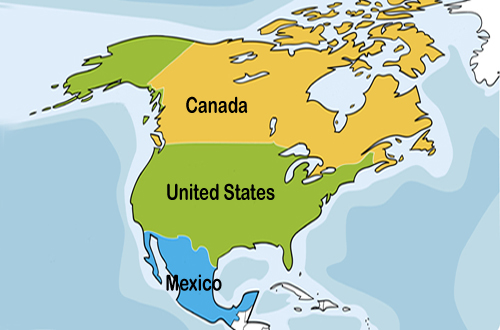
Raheel Ahmed (Grade 12 International Business)
On January 20, 2017, all of America bid farewell to the first African-American President in United States history and witnessed the inauguration of a man whose campaign was deemed controversial by many. With many claims and promises sent out to various citizens of the United States, Donald Trump quickly gained a lot of traction as he exclaimed his view on the North American Free Trade Agreement (NAFTA) stating, “[NAFTA] is the worst trade deal maybe ever signed anywhere, but certainly ever signed in this country” (Gillespie, 2016).
NAFTA was a trade agreement originally signed in 1994 which allowed all North American countries to move goods and services across the borders freely, however with the support of Trump’s campaign many started to believe that this agreement was a catalyst for an incline in loss of jobs in America.

Trump blamed NAFTA for supposedly destroying America’s manufacturing industry and further stated that America had 12.2 million manufacturing workers, down from 17 million when the agreement was first signed (Gillespie, 2016). One can simply conclude that not every worker lost it’s job due to this agreement. Advancements in technology alongside many other reasons have eliminated many jobs around the world as well.
Alan Deardoff, an economist at the Gerald R. Ford School of Public Policy at the University of Michigan proclaimed, “It’s just nonsense to say NAFTA is responsible for the decline of manufacturing jobs in the U.S.”. In addition, other research also agrees with this claim as an analysis of NAFTA’s economic impact found that it didn’t cause a massive loss of jobs in the respected industry and instead had a positive impact on the U.S. economy, despite the numerous claims made by the elected President, Donald Trump.
Therefore, it becomes evident that the increase in loss of jobs in America was not solely due to NAFTA, other considerations played a role as well, which raises a very important question one should ask as one ponders over the alluring topic of politics. How do politicians sway one’s opinion(s)?
Furthermore, it is evident that many individuals vote for politicians based on various reasons, however, how many people actually decide to research and then come to a conclusion on who to vote on? The truth is, not many (MacFarquhar & Saunders, 2016).
This research further proves that many individuals in North America vote for people based on their respective parties instead of the promises they make, with a large percentage of people not voting at all. Moreover, this is alarming as many aspects of life fall under the hands of these elected individuals, yet a percentage of mankind let different reasons sway their own opinions. Opinions that can help save many.

Thus, as we high school students will soon go out to be functioning citizens of our nation, we should aim to always do our research when it comes to politics and the promises made in campaigns prior to voting and not let our personal opinions get swayed by the ignorant mindsets of those trying to lead our country. Only then will we see proper societal advancement in every field.
I enjoyed reading through this blog as it was very well done and the arguments were solid, supported by the graphs and graphics attached throughout. I also agree with your closing argument, discussing the element of youth voters being swayed by others. I think that is a genuine issue with younger voters as they fall into the persona of the politician and not the policies. Also I appreciate the fact that you have provided evidence for all arguments and facts throughout the blog.
– Ali Bhangu